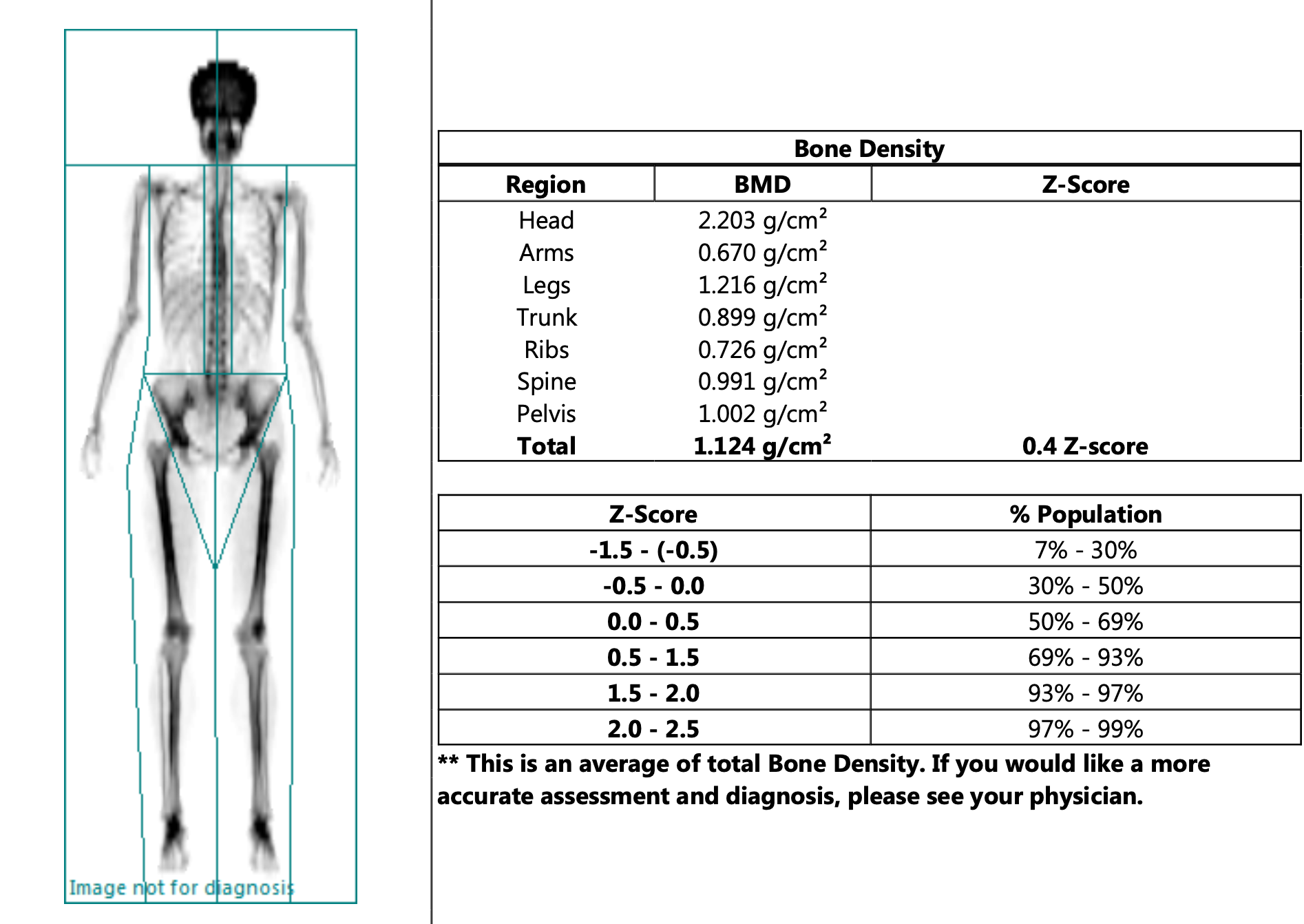I was recently talking to somebody about healthcare (one of my favorite topics) when they started to tell me about their experience with a DEXA scan. “My Z-score is 2.9,” they said. “I forget what a Z-score even is,” I thought in my head.
After this conversation, I realized that I needed to get a DEXA scan and figure out what my Z-score is.
I went to a location in Tigard, OR. They have a van with a DEXA machine in it. In the van, I laid down on a table for less than 10 minutes while a scanner slowly went over my body. “Can I talk during this?” I asked the tester. He responded, “Yeah, totally fine! Just don’t move around a lot. “What type of population (people) come in and get this the most?” I asked him. “We see a lot of active people, but all sorts of people come in.” I hopped out of the van and that was pretty much it!
I got an email a couple of days later. My z-score is 0.4! What?! The person I was chatting with had 2.9, and mine is 0.4? After looking into some things, I found out that 0.4 isn’t all that bad.
So, what does all this mean? What is a DEXA scan? What’s a Z-score?
What is a DEXA scan?
A DEXA scan measures body composition (fat, muscle, bone). It’s considered the “gold standard,” for measuring muscle, fat, and bone composition. Meaning, it’s the best test we have right now for it. It uses two different rays that are absorbed differently by these structures in our bodies. The scanner then creates a map of your body. The test itself is less than 10 minutes. You should be well-hydrated and there’s no eating at least 3 hours prior.
Who should get it?
Anyone interested in learning more about their body and overall health! Athletes commonly get it to measure fat vs. muscle mass composition, but anyone can get it. DEXA scans are also commonly used to measure bone density to check whether someone has osteoporosis or osteopenia (in this case, they measure T-scores, not Z-scores).
What’s the cost?
They vary, but the one I got was $120-130.
What’s a Z-score?
I was familiar with the T-score which is a measure that is commonly discussed with a diagnosis such as osteoporosis (low bone density), but not as familiar with Z-score! The Z-score compares your bone density to an average of others of your own age vs. the T-score compares your bone density to that of a healthy 30-year-old. Z-scores are used for children, young adults, pre-menopausal women, and men under 50 years old.
What’s the benefit of a DEXA?
The DEXA helps you understand more about your body and overall health. It could explain why you might weigh more but not “look like it”. Maybe it’s because you have more muscle mass. The DEXA results show numbers other than the Z-score. For example, android fat which is a measure of abdominal fat. Your android fat number should be lower than overall body fat which you get in the DEXA. Higher android fat is associated with other health problems. The DEXA could be used as a health “checkpoint.” Considering getting a scan once every X amount of years allows you to track health changes over time.
Here are my bone density results! If you look at my skeleton, do you see the little scoliosis in my thoracic (upper back) area?
Is it worth it?
Personally, I would say yes! However, this doesn’t mean it will be “worth it” to you! The DEXA is not cheap, and some would say it’s not necessary, but learning more about your body is extremely valuable.
If you are considering getting a DEXA and want to learn more, feel free to email me at brookecarmen@wholebodyhealthpt.com, and I can share more about my experience!


